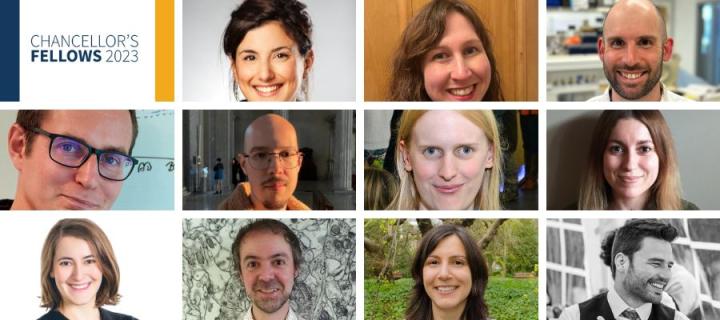Chancellor's Fellows 2023 - round one
Welcoming eleven new fellows to the College.

The following early career researchers have been awarded a Chancellor's Fellowship with the College of Medicine and Veterinary Medicine:
Nezha Benabdallah – MRC Human Genetics Unit, Institute of Genetics and Cancer
Nezha's research will focus on mesenchymal tumours that arise from chimeric fusions of chromatin factors. By investigating the mechanisms underlying these tumours, she will explore how chromatin regulators impact gene (de)regulation and drive tumorigenesis.
Holly Tibble – Centre for Medical Informatics, Usher Institute
Holly's research is primarily in asthma attack risk prediction, using routinely collected medical data. As well as continuously refining the data analysis methods, she will be bridging key knowledge gaps in stakeholder requirements and preferences, and developing a complex intervention to evaluate how such a tool can be used to improve clinical practice.
James Glover - Roslin Institute
James' fellowship will delineate the roles of molecular signalling and the mechanocellular environment in the formation of embryonic patterns during vertebrate development; a process essential for the correct function of tissues and organs. Using a multidisciplinary approach, he will investigate these patterning events during organogenesis using the chick embryo as a primary model and developing novel transgenic avian technologies to answer our key scientific questions. This research will enhance our understanding of fundamental biological processes, provide insight into developmental disorders and has the potential to guide future tissue regeneration strategies.
Konrad Rawlik – Centre for Inflammation Research, Institute for Regeneration and Repair
Konard will be identifying drug targets of relevance to specific individuals and stages of disease. Based on genotype information he aims to, not only, identify sub-groups of individuals, but also link these sub-groups to specific targetable molecular pathways over the course of disease. The research will move away from current genetic approaches, which treat disease as homogenous across individuals and time, and will develop computational and statistical methods to detect mechanistically-coherent subgroups in complex populations.
Jaime Garcia Inglesias – Centre for Population Health Sciences, Usher Institute
Jaime will be exploring the sexual wellbeing needs of gender and sexual minority groups. He will focus on the impact of technology and pandemics, such as COVID-19 and Mpox, across national and international contexts. He will focus not only on the health benefits of interventions supporting wellbeing, but also on their cultural and social implications.
Laura Glendinning - Roslin Institute
Laura will investigate how the gastrointestinal microbiota of avian species (chickens and red grouse) ferment dietary fibre. The overarching goal of the fellowship is to understand the interactions between diet, host and microbiota, in order to generate knowledge that can improve poultry production sustainability, and inform wildlife conservation efforts. While she will initially focus on avian species, in the future, Laura plans to extend her research into other species of importance in livestock research, wildlife conservation, and as companion animals.
Elizabeth Haythorne - Centre for Cardiovascular Science
Type 2 diabetes currently afflicts more than 4.5 million people worldwide and is characterised by chronic hyperglycaemia, resulting from a failure of pancreatic β-cells to secrete adequate amounts of insulin in response to elevated blood glucose. I have previously shown that chronic hyperglycaemia alters glucose metabolism in β-cells, which leads to loss of insulin secretion. Elizabeth proposes to investigate these findings further in order to precisely identify where the defect occurs in glucose metabolism during diabetes and how it might be alleviated.
Sofia Ferreira Gonzalez – Centre for Inflammation Research, Institute for Regeneration and Repair
We are living longer than at any time in human history, but we are not living better: with age we are at risk of developing a plethora of conditions for which cures remain elusive. As a Chancellor’s fellow, Sofia aims to revolutionize the current perception of ageing -as an inevitable process- and provide new tools to increase regeneration and promote healthy ageing for the next generation. Her research program combines regenerative medicine and anti-ageing strategies, exploring the role of senescence and the primary cilia in the epithelium, using novel animal models such as the accelerated regeneration model spiny mouse.
Nick Robinson - Centre for Discovery Brain Sciences
Nick wants to determine the population level neural dynamics or 'code' which underlies our ability to form, consolidate and retrieve episodic memories. He uses combined optical and electrophysiological recording of neural activity with targeted cellular resolution manipulations during complex behaviours. This approach allows causal links to be made between neural activity and memory.
Susana Ribeiro dos Louros - Centre for Discovery Brain Sciences
Susana will investigate molecular mechanisms governing synapse remodelling, a process that shapes our brain throughout life and when disrupted results in brain disorders. Building from a pioneering study that uncovered the dysfunction of the ubiquitin proteasome system (UPS) as a new pathological contributor to Fragile X syndrome, the leading monogenic cause of autism (Louros, Seo et al, Neuron, 2023), her research will focus on understanding how the UPS contributes to sculpting of brain circuits during development and plasticity. Her research program will also lead to the design of novel and more targeted approaches to modulate the UPS and restore brain function in neurodevelopmental disorders.
Steven Kerr – Centre for Medical Informatics, Usher Institute
Steven will be carrying out research that aims to combine federated analytics and secure multi-party computation. This will allow private health data held securely across any number of locations to be analysed with zero information sharing.

